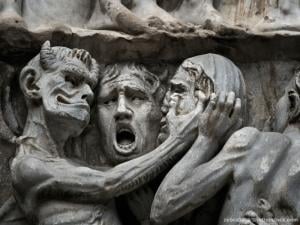 Have you ever used this one, “the devil made me do it”?
Have you ever used this one, “the devil made me do it”?
If we are honest, many of us have, even if half joking.
But did he? Did the devil make you do whatever it is?
In a day when science on one hand often dismisses the supernatural altogether, and cultural pluralism tells us that all spirituality is equally desirable it is increasingly harder to find anyone who believes both in the spirit world and evil.
Anyone who opens the Bible with any integrity must admit that it is a book that consistently presents a worldview in which there is a very real war between the real God and his holy angels verses the fallen angel Satan the Devil and unholy demons. Sinners, including you and me, are taken as captives in this spiritual war (e.g. Col. 1:13; 2 Tim. 2:25–26).
Admittedly, this area of Bible study, often called spiritual warfare, is incredibly controversial. But, it is also incredibly vital. So, in this series of blogs we will examine what the Bible really says about spiritual warfare answering nine questions about the Devil and his demons.
Question 1: What’s Spiritual Warfare and what’s that got to do with me?
Are you a Christian who has ever wondered why life is so hard, suffering is so painful, agony is always near, and God seems far away? It’s because there’s an enemy who hates God, hates you, and has set his army against you because you’re in a citizen and servant of Jesus’ Kingdom. God loves you. But Satan hates you. God plans good for you. But Satan plots to destroy you.
Every Christian is a soldier in a war—including little kids praying to Jesus at night and old ladies who wear head coverings as they carry their King James Bibles into church. When we don’t know that life is a war and Satan is an enemy, or forget when we need to know it most, we can’t make sense of our struggles, suffering, and strife. When this happens, we wrongly interpret everything negative in our lives as solely from God when in reality it is often an attack from our enemy or a result of our own bad choices. The good news is that rather than God judging us, he poured out his wrath on Jesus, who secured victory over Satan, sin, and death for us on the cross by releasing their ownership of us through sin.
When life gets hard, we can easily forget that we’re victorious in Christ and lose hope. Some people practice self-centered contempt and blame themselves when things go wrong. Some practice others-centered contempt and blame other people. And some practice God-centered contempt and blame God. The trouble in our life is sometimes partially the fault of our sin or someone else’s sin, but sin is never the fault of God, as he is good and does not cause sin. Behind all sin, however, is Satan. While we remain morally responsible for our sin, Satan sometimes also bears some degree of responsibility, as he is the deceiver who delights when we join him in his rebellion against God.
Throughout the Scriptures we see Satan and demonic powers at work frequently. God wants us to know that we’re in a spiritual battle. If we really believe this, we view life differently. We no longer expect comfort and ease in this life any more than an exhausted soldier on the front lines of battle.
This begs the question, why do Christians so often act surprised when trouble comes into our lives? Perhaps the trouble begins with how we’re invited to become Christians. In varying ways we’re told, “Confess your sins to Jesus, and he will take you to heaven.” While true, what’s often left out is the time between our commitment to Christ and the day we see him face to face—also called life. And it’s probably also because we often suffer from spiritual amnesia—forgetting who we are in Christ, and forgetting the spiritual battle we’re engaged in. But the reality is that in this life there’s a war between two kings, Jesus and Satan; two kingdoms, light and darkness; and two armies, Jesus’ and Satan’s. And while the Bible promises us that King Jesus is victorious, we’re on a pilgrimage to get to Jesus’ eternal kingdom while preaching the gospel by the power of the Holy Spirit in hopes of setting some war captives free from their bondage to Satan, sin, and death.
Question 2: What does the Bible really say about spiritual warfare? Is there a biblical back-story to all this that will help me to better understand this supernatural battle?
According to the Bible, angels are spirit beings created by God to serve his purposes. However, one angel became proud, which is the root of much sin, and preferred to be his own god rather than worship and obey the real God (Isa. 14:11–23; Ezek. 28:12). We now know him by various names such as satan, the dragon, the serpent, the enemy, the devil, the tempter, the murderer, the father of lies, the adversary, the accuser, the destroyer, and the evil one. Tragically, one-third of the angels sided with Satan to declare war on God (Isaiah 14:12; Luke 10:18; Hebrews 12:22; Revelation 9:1, 12:3-9).
Their rebellion culminated in a great battle against God and his holy angels. Satan and his demons lost and were kicked out of heaven without the possibility of ever being forgiven or reconciled into a right relationship with God (2 Pet. 2:4).
After the great war in heaven, continuing on with the story of Scripture, the scene shifts to a new battlefield—earth. Here, Satan attacked our first parents, our father Adam and mother Eve. Satan lied to Eve and tempted her to sin, just as he did each of us. Adam, whom God appointed to love and care for Eve, failed to protect her, and knowingly joined her in sin.
Both Adam and Eve chose lies over truth, pride over humility, folly over wisdom, death over life, and Satan over God. Subsequently, each of us descendants of our first parents is conceived with a sinful nature marked by a disposition to follow in their tragic footsteps (Romans 5:12-21). Furthermore, as sinners we have experienced the same painful consequences as our first parents. Because of the sins we have each committed, we were alienated from God and hid from him in shame.
Then the first promise of Jesus as your victor over Satan came to our first parents. In Genesis 3:15, God preached the first good news, or gospel, of Jesus to our mother Eve, who, like us all, was a broken, shame-filled, guilty sinner. God promised Eve that Jesus would be born of a woman and would grow to be a man who would battle with Satan and stomp his head, defeat him, and liberate people from their captivity to Satan, sin, death, and hell.
Years later Jesus was born to his mother, Mary, as promised. Satan’s attack on Jesus commenced when Jesus was only a boy. King Herod, who was a descendant of a demonically influenced family line of evil political dictators, decreed that all firstborn sons be put to death in an effort to murder Jesus as an infant. Satan was, in fact, working behind this plot because he rightly knew that Jesus had come to conquer him and liberate his captives. But God warned Jesus’ parents of the plot, and they fled to Egypt as refugees, so Jesus’ life was spared.
As a young man, Jesus was again attacked by Satan, who offered him a much easier life than the one planned out for him by God the Father. God the Father sent Jesus to earth on the mission of living a sinless life and going to the cross to die for sinners. In contrast, Satan offered a kingdom without a cross and promised that Jesus could rule in glory and power without any opposition or crucifixion so long as he bowed down in honor to Satan. Satan set forth his proposal with a simple friendship offer of food, of breaking bread with Jesus, while Jesus was very hungry following forty days of fasting. Jesus wisely rejected this “gift.” Like Jesus, it is very wise for us to be suspicious of spirit beings bearing gifts (e.g. healing, insight, prosperity), even if they appear to be good things. This is why discernment is so vital when dealing with the spirit real as bad spirits are willing to give good gifts for bad purposes.
Leading up to the cross, Satan entered one of Jesus’ own disciples, Judas Iscariot—who was in reality an unbeliever—and conspired with him to betray Jesus and hand him over to be crucified. Through the cross, Satan and his demons thought that they had finally defeated Jesus. If we picture the Lord Jesus hanging on the cross, bloodied and dying, it admittedly appears in every way that Jesus was hanging his head in defeat at the hands of Satan. On this point, the great Reformation pastor Martin Luther was fond of reflecting on Isaiah 45:15, which says of Jesus, “Truly, you are a God who hides [yourself], O God of Israel, the Savior.” Luther’s point in this verse is that on the cross Jesus hid his victory in defeat, hid his glory in shame, and hid our life in his death. Satan and the demons did not see this because they lacked the sight of faith and did not understand the humility of Jesus.
Nonetheless, on the cross Jesus bled and died for you, and by faith, as you look to the cross, you will see the great lengths he has gone to in the conquering of your Enemy and the liberating of your life. Consequently, Jesus’ words, “It is finished,” from the cross are his heralding of your liberation. Crucifying Jesus was the biggest mistake the Devil ever made. Had he understood what was happening, he may have never have killed Jesus, as it says in 1 Corinthians 2:6–9:
Yet among the mature we do impart wisdom, although it is not a wisdom of this age or of the rulers of this age, who are doomed to pass away. But we impart a secret and hidden wisdom of God, which God decreed before the ages for our glory. None of the rulers of this age understood this, for if they had, they would not have crucified the Lord of glory. But, as it is written, “What no eye has seen, nor ear heard, nor the heart of man imagined, what God has prepared for those who love him.”
My favorite portion of Scripture on the victory of Jesus over Satan, sin, and death is Colossians 2:13–15:
And you, who were dead in your trespasses and the uncircumcision of your flesh, God made alive together with him, having forgiven us all our trespasses, by canceling the record of debt that stood against us with its legal demands. This he set aside, nailing it to the cross. He disarmed the rulers and authorities and put them to open shame, by triumphing over them in him.
Thankfully, the Lord Jesus came to rescue you and me. Unlike us, he resisted Satan’s temptations on every occurrence and lived the sinless life that we have not lived. Jesus then went to the cross to die the death we should have died. On the cross, Jesus died in our place for our sins. He died a death He did not deserve to give us a salvation that we cannot earn.
The battle for our souls is real, and like captives in a war (Col. 1:13; 2 Tim. 2:25–26) we have been tortured and brainwashed. But the good news is that Jesus came to rescue us. Jesus himself confirmed this fact in Luke 4:18 when, at the beginning of his earthly ministry, he said he had come to set captives free. There is no way that Satan would have released us from his captivity, and no way that we could liberate ourselves, so Jesus came as our triumphant warrior and liberator. Apart from Jesus, there is no spiritual freedom in this life or real life that begins when this life ends.
Portions of this blog post were adapted from Who Do You Think You Are? (2013, Thomas Nelson), by Mark Driscoll, Death By Love (2008, Crossway), by Mark Driscoll and Gerry Breshears, and Doctrine (2010, Crossway), by Mark Driscoll and Gerry Breshears.












